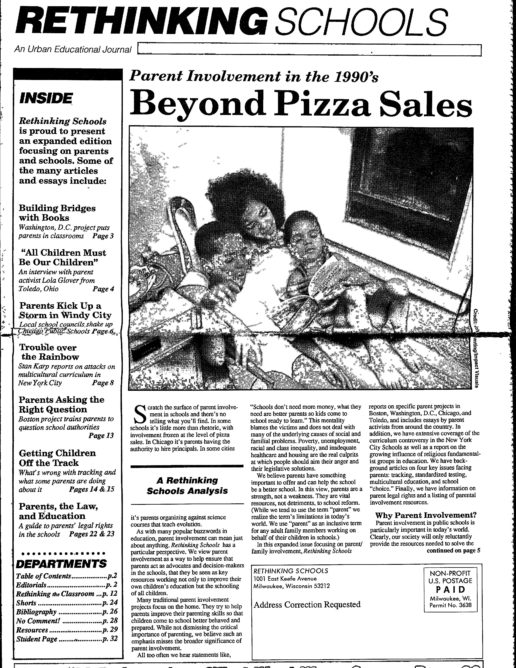Parents Asking the Right Question
Boston Project Trains Parents
BOSTON — At 6:30 p.m., after a particularly cold winter day, about 25 public school parents gathered in a semi-circle.
They sat nervously, awaiting the start of a school-related conference. The two women who called the meeting passed out forms showing basic arithmetic problems given to first graders. Then they passed out examples of work given to children in 12th grade.
Much to everyone’s surprise, both times the parents were given the same basic arithmetic problems.
The group buzzed with questions. Why were their children in 12th grade given such basic problems? Could they talk to the teacher? Could they look at the curriculum? What is going on? Why weren’t they told that their children were doing so poorly in math? A lively discussion ensued.
The gathering was not a “real” school conference. Rather, the “conference” was a role-playing workshop organized by a parent training group called The Right Question. Interestingly, however, none of the parents at the workshop said the math problem was extreme and could never happen.
A two-year-old project started in nearby Somerville and Lawrence among Latino parents, The Right Question gives workshops that teach parents how to deal with school officials and ask questions that can help them advocate for their children. It was formed on the premise that democracy needs citizens who can ask questions.
The privately funded project targets low-income parents, who often have the least connection to parent-support groups. Even if their children do not have troubles at school, many poor or minority parents avoid school conferences or don’t have the self-confidence to ask questions of school staff.
As a The Right Question leaflet explains, “Parents do not need to be experts to advocate for their children, but they do need to be able to ask questions of the experts.
We have learned from many parents that when they acquire self-advocacy skills, they are more able and more likely to support, monitor, and advocate for their children’s education and for education reform.”
In Boston, the Right Question Project has joined with the Parents’ Institute for Quality Urban Education — a citywide coalition of community and school groups — to form a Parents Organizing Project that makes use of The Right Question’s workshop strategy.
The strategy encourages parents to ask questions about how decisions are made, who makes them, what criteria are used, and how those decisions will affect them. It focuses on four issues:
- How can low-income parents become an active constituency for educational reform?
- How can family literacy programs prepare parents to be effective monitors and advocates throughout their children’s schooling?
- How can one further develop critical-thinking and advocacy skills among disenfranchised citizens?
- How can one enable ordinary citizens to hold public institutions accountable?
The Right Question’s organizing strategy is based on community workshops by trained facilitators. The facilitators try to give parents the self-esteem and self-confidence needed to take part in school issues, using role-plays of everyday school situations. In the workshop I attended this winter, concerns ranged from basic curriculum issues such as the math problem to wider issues such as discipline and demands for multicultural curricula.
Since mid-1990, The Right Question has led more than 24 workshops involving 400 predominantly Latino parents.
Educator Dan Rothstein started the project, whose board of directors includes both parents and well-known academics such as child psychologist Robert Coles fr m Harvard University.
The project has honed its workshop strategy, using everyday settings outside the schools like living rooms, church basements, English as a second language classes, and adult literacy classes. It plans to expand its scope in the coming year by training new parents to offer similar workshops around the city.
Part of the value of the project’s approach is that it does not involve expensive materials or high-paid consultants. Rather, it is part of an education reform strategy that is linked to community-based efforts. Its methods apply not only to education, but other situations where low-income communities must deal with publicly funded bureaucracies.
The Project’s Approach
For school activists, The Right Question Project suggests a different way to think about school reform. Generally, public school reform efforts are built around those who are already involved, especially teachers and professional educators. Parents and students who want to assert their rights often face a bewildering landscape of pre-existing programmatic conflicts, philosophical debate, and budget issues. As groups try to become more sophisticated in order to take on city and school authorities, it can become even more difficult for new parents to join in.
Realistically, only a relative handful of parents can or will learn the language of teachers, administrators, and educators. This limits the ability of most parents to advocate for their children. It also limits all parents and community members who want to build effective movements involving both schools and the communities they serve.
Ultimately, any citywide or broader coalition has to address these issues. The Right Question Project’s approach is a potentially tremendous resource, especially when it can be used in conjunction with specific organizing by other groups around issues such as tracking.
The parents of students in our urban schools must be brought into the process of reform, not as add-ons but as essential players. The Right Question Project seems to be on the right track to help accomplish this.

